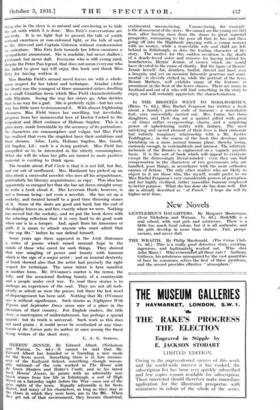HERRIN' JENNIE. By Edward Albert. (Nicholson and Watson. 7s. 6d.)—It
cannot be said that Mr. }Award Albert has founded or is founding a new mode for the Scots novel. Something there is in him reminis- cent of the Kailyard School, something—though reason- ably rationed—of the vein worked in The House with- the Green Shutters and Hatter's Castle, and in his latest book Herrin' Jennie, he paints with an admirably sure" brush scenes from low life in Edinburgh, a sort of High Street on a Saturday night before the War—once one of the grim sights of the town. Equally admirable is his Scots dialect, and many of his characters, as long as they stay in the closes in which they were born, are to the ftfe. When they get out of that environment, they become theatrical,'
sentimental, unconvincing. Unconvincing, for example.
is the Nnonement of the story. We cannot see the'young (or old) Scot, after having risen from the slums to great material prosperity, renouncing to the poor all that he has and the: going off into the Highlands gipsying with a young woman with no money, while a respectable wife and child are left behind in Edinburgh, as does the leading character of th' story. The motive for this sudden revulsion is the death of a dearly-loved sister and remorse for having robbed his benefactress, Herrin' Jennie, of money which she would have devoted to the cause of charity. But the figure of Herrin' Jennie herself—fat, drunken, lustful, shreWd and hard over a bargain, and yet on occasion fatuously generous and senti- mental—is cleverly etched in, while the portrait of the hero, Bennie Mathers,• well exhibits many of the features so prominent in the Scot of the lower classes. There arc many in Scotland and out of it who will find something in the story to enjoy and will certainly appreciate the characterization.










































 Previous page
Previous page